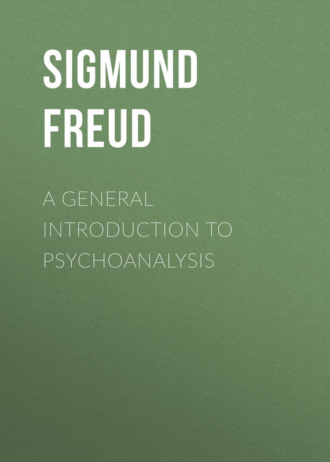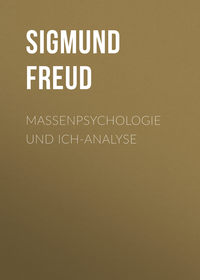 полная версия
полная версияA General Introduction to Psychoanalysis
Yes, this time you struck a hard problem. I can imagine the unknown speaker. He is probably an assistant to the guest of honor, perhaps already a minor official, a young man with the brightest prospects. I will press him as to whether he did not after all feel conscious of something which may have worked in opposition to the demand that he do honor to the chief. What a fine success I'll have! He becomes impatient and suddenly bursts out on me, "Look here, you'd better stop this cross-examination, or I'll get unpleasant. Why, you'll spoil my whole career with your suspicions. I simply said 'auf-gestossen' instead of 'an-gestossen,' because I'd already said 'auf' twice in the same sentence. It's the thing that Meringer calls a perservation, and there's no other meaning that you can twist out of it. Do you understand me? That's all." H'm, this is a surprising reaction, a really energetic denial. I see that there is nothing more to be obtained from the young man, but I also remark to myself that he betrays a strong personal interest in having his slip mean nothing. Perhaps you, too, agree that it is not right for him immediately to become so rude over a purely theoretical investigation, but, you will conclude, he really must know what he did and did not mean to say.
Really? Perhaps that's open to question nevertheless.
But now you think you have me. "So that is your technique," I hear you say. "When the person who has committed a slip gives an explanation which fits your theory, then you declare him the final authority on the subject. 'He says so himself!' But if what he says does not fit into your scheme, then you suddenly assert that what he says does not count, that one need not believe him."
Yet that is certainly true. I can give you a similar case in which the procedure is apparently just as monstrous. When a defendant confesses to a deed, the judge believes his confession. But if he denies it, the judge does not believe him. Were it otherwise, there would be no way to administer the law, and despite occasional miscarriages you must acknowledge the value of this system.
Well, are you then the judge, and is the person who committed the slip a defendant before you? Is a slip of the tongue a crime?
Perhaps we need not even decline this comparison. But just see to what far-reaching differences we have come by penetrating somewhat into the seemingly harmless problems of the psychology of errors, differences which at this stage we do not at all know how to reconcile. I offer you a preliminary compromise on the basis of the analogy of the judge and the defendant. You will grant me that the meaning of an error admits of no doubt when the subject under analysis acknowledges it himself. I in turn will admit that a direct proof for the suspected meaning cannot be obtained if the subject denies us the information; and, of course, that is also the case when the subject is not present to give us the information. We are, then, as in the case of the legal procedure, dependent on circumstances which make a decision at one time seem more, and at another time, less probable to us. At law, one has to declare a defendant guilty on circumstantial evidence for practical reasons. We see no such necessity; but neither are we forced to forego the use of these circumstances. It would be a mistake to believe that a science consists of nothing but conclusively proved theorems, and any such demand would be unjust. Only a person with a mania for authority, a person who must replace his religious catechism with some other, even though it be scientific, would make such a demand. Science has but few apodeictic precepts in its catechism; it consists chiefly of assertions which it has developed to certain degrees of probability. It is actually a symptom of scientific thinking if one is content with these approximations of certainty and is able to carry on constructive work despite the lack of the final confirmation.
But where do we get the facts for our interpretations, the circumstances for our proof, when the further remarks of the subject under analysis do not themselves elucidate the meaning of the error? From many sources. First of all, from the analogy with phenomena extraneous to the psychology of errors; as, for example, when we assert that the distortion of a name as a slip of the tongue has the same insulting significance as an intentional name distortion. We get them also from the psychic situation in which the error occurred, from our knowledge of the character of the person who committed the error, from the impressions which that person received before making the error, and to which he may possibly have reacted with this error. As a rule, what happens is that we find the meaning of the error according to general principles. It is then only a conjecture, a suggestion as to what the meaning may be, and we then obtain our proof from examination of the psychic situation. Sometimes, too, it happens that we have to wait for subsequent developments, which have announced themselves, as it were, through the error, in order to find our conjecture verified.
I cannot easily give you proof of this if I have to limit myself to the field of tongue slips, although even here there are a few good examples. The young man who wished to "inscort" the lady is certainly shy; the lady whose husband may eat and drink whatever she wants I know to be one of those energetic women who know how to rule in the home. Or take the following case: At a general meeting of the Concordia Club, a young member delivers a vehement speech in opposition, in the course of which he addresses the officers of the society as: "Fellow committee lenders." We will conjecture that some conflicting idea militated in him against his opposition, an idea which was in some way based on a connection with money lending. As a matter of fact, we learn from our informant that the speaker was in constant money difficulties, and had attempted to raise a loan. As a conflicting idea, therefore, we may safely interpolate the idea, "Be more moderate in your opposition, these are the same people who are to grant you the loan."
But I can give you a wide selection of such circumstantial proof if I delve into the wide field of other kinds of error.
If anyone forgets an otherwise familiar proper name, or has difficulty in retaining it in his memory despite all efforts, then the conclusion lies close at hand, that he has something against the bearer of this name and does not like to think of him. Consider in this connection the following revelation of the psychic situation in which this error occurs:
"A Mr. Y. fell in love, without reciprocation, with a lady who soon after married a Mr. X. In spite of the fact that Mr. Y. has known Mr. X. a long time, and even has business relations with him, he forgets his name over and over again, so that he found it necessary on several occasions to ask other people the man's name when he wanted to write to Mr. X."12
Mr. Y. obviously does not want to have his fortunate rival in mind under any condition. "Let him never be thought of."
Another example: A lady makes inquiries at her doctor's concerning a mutual acquaintance, but speaks of her by her maiden name. She has forgotten her married name. She admits that she was much displeased by the marriage, and could not stand this friend's husband.13
Later we shall have much to say in other relations about the matter of forgetting names. At present we are predominantly interested in the psychic situation in which the lapse of memory occurs.
The forgetting of projects can quite commonly be traced to an antagonistic current which does not wish to carry out the project. We psychoanalysts are not alone in holding this view, but this is the general conception to which all persons subscribe the daily affairs, and which they first deny in theory. The patron who makes apologies to his protegé, saying that he has forgotten his requests, has not squared himself with his protegé. The protegé immediately thinks: "There's nothing to that; he did promise but he really doesn't want to do it." Hence, daily life also proscribes forgetting, in certain connections, and the difference between the popular and the psychoanalytic conception of these errors appears to be removed. Imagine a housekeeper who receives her guest with the words: "What, you come to-day? Why, I had totally forgotten that I had invited you for to-day"; or the young man who might tell his sweetheart that he had forgotten to keep the rendezvous which they planned. He is sure not to admit it, it were better for him to invent the most improbable excuses on the spur of the moment, hindrances which prevented him from coming at that time, and which made it impossible for him to communicate the situation to her. We all know that in military matters the excuse of having forgotten something is useless, that it protects one from no punishment; and we must consider this attitude justified. Here we suddenly find everyone agreed that a certain error is significant, and everyone agrees what its meaning is. Why are they not consistent enough to extend this insight to the other errors, and fully to acknowledge them? Of course, there is also an answer to this.
If the meaning of this forgetting of projects leaves room for so little doubt among laymen, you will be less surprised to find that poets make use of these errors in the same sense. Those of you who have seen or read Shaw's Caesar and Cleopatra will recall that Caesar, when departing in the last scene, is pursued by the idea that there was something more he intended to do, but that he had forgotten it. Finally he discovers what it is: to take leave of Cleopatra. This small device of the author is meant to ascribe to the great Caesar a superiority which he did not possess, and to which he did not at all aspire. You can learn from historical sources that Caesar had Cleopatra follow him to Rome, and that she was staying there with her little Caesarion when Caesar was murdered, whereupon she fled the city.
The cases of forgetting projects are as a rule so clear that they are of little use for our purpose, i.e., discovering in the psychic situation circumstantial evidence of the meaning of the error. Let us, therefore, turn to a particularly ambiguous and untransparent error, that of losing and mislaying objects. That we ourselves should have a purpose in losing an object, an accident frequently so painful, will certainly seem incredible to you. But there are many instances similar to the following: A young man loses the pencil which he had liked very much. The day before he had received a letter from his brother-in-law, which concluded with the words, "For the present I have neither the inclination nor the time to be a party to your frivolity and your idleness."14 It so happened that the pencil had been a present from this brother-in-law. Without this coincidence we could not, of course, assert that the loss involved any intention to get rid of the gift. Similar cases are numerous. Persons lose objects when they have fallen out with the donors, and no longer wish to be reminded of them. Or again, objects may be lost if one no longer likes the things themselves, and wants to supply oneself with a pretext for substituting other and better things in their stead. Letting a thing fall and break naturally shows the same intention toward that object. Can one consider it accidental when a school child just before his birthday loses, ruins or breaks his belongings, for example his school bag or his watch?
He who has frequently experienced the annoyance of not being able to find something which he has himself put away, will also be unwilling to believe there was any intent behind the loss. And yet the examples are not at all rare in which the attendant circumstances of the mislaying point to a tendency temporarily or permanently to get rid of the object. Perhaps the most beautiful example of this sort is the following: A young man tells me: "A few years ago a misunderstanding arose in my married life. I felt my wife was too cool and even though I willingly acknowledged her excellent qualities, we lived without any tenderness between us. One day she brought me a book which she had thought might interest me. I thanked her for this attention, promised to read the book, put it in a handy place, and couldn't find it again. Several months passed thus, during which I occasionally remembered this mislaid book and tried in vain to find it. About half a year later my beloved mother, who lived at a distance from us, fell ill. My wife left the house in order to nurse her mother-in-law. The condition of the patient became serious, and gave my wife an opportunity of showing her best side. One evening I came home filled with enthusiasm and gratitude toward my wife. I approached my writing desk, opened a certain drawer with no definite intention but as if with somnambulistic certainty, and the first thing I found is the book so long mislaid."
With the cessation of the motive, the inability to find the mislaid object also came to an end.
Ladies and gentlemen, I could increase this collection of examples indefinitely. But I do not wish to do so here. In my Psychopathology of Everyday Life (first published in 1901), you will find only too many instances for the study of errors.15
All these examples demonstrate the same thing repeatedly: namely, they make it seem probable that errors have a meaning, and show how one may guess or establish that meaning from the attendant circumstances. I limit myself to-day because we have confined ourselves to the purpose of profiting in the preparation for psychoanalysis from the study of these phenomena. I must, however, still go into two additional groups of observations, into the accumulated and combined errors and into the confirmation of our interpretations by means of subsequent developments.
The accumulated and combined errors are surely the fine flower of their species. If we were interested only in proving that errors may have a meaning, we would limit ourselves to the accumulated and combined errors in the first place, for here the meaning is unmistakable, even to the dullest intelligence, and can force conviction upon the most critical judgment. The accumulation of manifestations betrays a stubbornness such as could never come about by accident, but which fits closely the idea of design. Finally, the interchange of certain kinds of error with each other shows us what is the important and essential element of the error, not its form or the means of which it avails itself, but the purpose which it serves and which is to be achieved by the most various paths. Thus I will give you a case of repeated forgetting. Jones recounts that he once allowed a letter to lie on his writing desk several days for reasons quite unknown. Finally he made up his mind to mail it; but it was returned from the dead letter office, for he had forgotten to address it. After he had addressed it he took it to the post office, but this time without a stamp. At this point he finally had to admit to himself his aversion against sending the letter at all.
In another case a mistake is combined with mislaying an object. A lady is traveling to Rome with her brother-in-law, a famous artist. The visitor is much fêted by the Germans living in Rome, and receives as a gift, among other things, a gold medal of ancient origin. The lady is vexed by the fact that her brother-in-law does not sufficiently appreciate the beautiful object. After she leaves her sister and reaches her home, she discovers when unpacking that she has brought with her – how, she does not know – the medal. She immediately informs her brother-in-law of this fact by letter, and gives him notice that she will send the medal back to Rome the next day. But on the following day, the medal has been so cleverly mislaid that it can neither be found nor sent, and at this point it begins to dawn upon the lady that her "absent-mindedness" means, namely, that she wants to keep the object for herself.16
I have already given you an example of a combination of forgetfulness and error in which someone first forgot a rendezvous and then, with the firm intention of not forgetting it a second time, appeared at the wrong hour. A quite analogous case was told me from his own experience, by a friend who pursues literary interests in addition to his scientific ones. He said: "A few years ago I accepted the election to the board of a certain literary society, because I hoped that the society could at some time be of use to me in helping obtain the production of my drama, and, despite my lack of interest, I took part in the meetings every Friday. A few months ago I received the assurance of a production in the theatre in F., and since that time it happens regularly that I forget the meetings of that society. When I read your article on these things, I was ashamed of my forgetfulness, reproached myself with the meanness of staying away now that I no longer need these people and determined to be sure not to forget next Friday. I kept reminding myself of this resolution until I carried it out and stood before the door of the meeting room. To my astonishment, it was closed, the meeting was already over; for I had mistaken the day. It was already Saturday."
It would be tempting enough to collect similar observations, but I will go no further; I will let you glance instead upon those cases in which our interpretation has to wait for its proof upon future developments.
The chief condition of these cases is conceivably that the existing psychic situation is unknown to us or inaccessible to our inquiries. At that time our interpretation has only the value of a conjecture to which we ourselves do not wish to grant too much weight. Later, however, something happens which shows us how justified was our interpretation even at that time. I was once the guest of a young married couple and heard the young wife laughingly tell of a recent experience, of how on the day after her return from her honeymoon she had hunted up her unmarried sister again in order to go shopping with her, as in former times, while her husband went to his business. Suddenly she noticed a gentleman on the other side of the street, and she nudged her sister, saying, "Why look, there goes Mr. K." She had forgotten that this gentleman was her husband of some weeks' standing. I shuddered at this tale but did not dare to draw the inference. The little anecdote did not occur to me again until a year later, after this marriage had come to a most unhappy end.
A. Maeder tells of a lady who, the day before her wedding, forgot to try on her wedding dress and to the despair of the dressmaker only remembered it later in the evening. He adds in connection with this forgetfulness the fact that she divorced her husband soon after. I know a lady now divorced from her husband, who, in managing her fortune, frequently signed documents with her maiden name, and this many years before she really resumed it. I know of other women who lost their wedding rings on their honeymoon and also know that the course of the marriage gave a meaning to this accident. And now one more striking example with a better termination. It is said that the marriage of a famous German chemist did not take place because he forgot the hour of the wedding, and instead of going to the church went to the laboratory. He was wise enough to rest satisfied with this one attempt, and died unmarried at a ripe old age.
Perhaps the idea has also come to you that in these cases mistakes have taken the place of the Omina or omens of the ancients. Some of the Omina really were nothing more than mistakes; for example, when a person stumbled or fell down. Others, to be sure, bore the characteristics of objective occurrences rather than that of subjective acts. But you would not believe how difficult it sometimes is to decide in a specific instance whether the act belongs to the one or the other group. It so frequently knows how to masquerade as a passive experience.
Everyone of us who can look back over a longer or shorter life experience will probably say that he might have spared himself many disappointments and painful surprises if he had found the courage and decision to interpret as omens the little mistakes which he made in his intercourse with people, and to consider them as indications of the intentions which were still being kept secret. As a rule, one does not dare do this. One would feel as though he were again becoming superstitious via a detour through science. But not all omens come true, and you will understand from our theories that they need not all come true.
FOURTH LECTURE
THE PSYCHOLOGY OF ERRORS – (Conclusion)
WE may certainly put it down as the conclusion of our labors up to this point that errors have a meaning, and we may make this conclusion the basis of our further investigations. Let me stress the fact once more that we do not assert – and for our purposes need not assert – that every single mistake which occurs is meaningful, although I consider that probable. It will suffice us if we prove the presence of such a meaning with relative frequency in the various forms of errors. These various forms, by the way, behave differently in this respect. In the cases of tongue slips, pen slips, etc., the occurrences may take place on a purely physiological basis. In the group based on forgetfulness (forgetting names or projects, mislaying objects, etc.) I cannot believe in such a basis. There does very probably exist a type of case in which the loss of objects should be recognized as unintentional. Of the mistakes which occur in daily life, only a certain portion can in any way be brought within our conception. You must keep this limitation in mind when we start henceforth from the assumption that mistakes are psychic acts and arise through the mutual interference of two intentions.
Herein we have the first result of psychoanalysis. Psychology hitherto knew nothing of the occurrence of such interferences and the possibility that they might have such manifestations as a consequence. We have widened the province of the world of psychic phenomena quite considerably, and have brought into the province of psychology phenomena which formerly were not attributed to it.
Let us tarry a moment longer over the assertion that errors are psychic acts. Does such an assertion contain more than the former declaration that they have a meaning? I do not believe so. On the contrary, it is rather more indefinite and open to greater misunderstanding. Everything which can be observed about the psychic life will on occasion be designated as a psychic phenomenon. But it will depend on whether the specific psychic manifestations resulted directly from bodily, organic, material influences, in which case their investigation will not fall within the province of psychology, or whether it was more immediately the result of other psychic occurrences back of which, somewhere, the series of organic influences then begins. We have the latter condition of affairs before us when we designate a phenomenon as a psychic manifestation, and for that reason it is more expedient to put our assertion in this form: the phenomena are meaningful; they have a meaning. By "meaning" we understand significance, purpose, tendency and position in a sequence of psychic relations.
There are a number of other occurrences which are very closely related to errors, but which this particular name no longer fits. We call them accidental and symptomatic acts. They also have the appearance of being unmotivated, the appearance of insignificance and unimportance, but in addition, and more plainly, of superfluity. They are differentiated from errors by the absence of another intention with which they collide and by which they are disturbed. On the other side they pass over without a definite boundary line into the gestures and movements which we count among expressions of the emotions. Among these accidental acts belong all those apparently playful, apparently purposeless performances in connection with our clothing, parts of our body, objects within reach, as well as the omission of such performances, and the melodies which we hum to ourselves. I venture the assertion that all these phenomena are meaningful and capable of interpretation in the same way as are the errors, that they are small manifestations of other more important psychic processes, valid psychic acts. But I do not intend to linger over this new enlargement of the province of psychic phenomena, but rather to return to the topic of errors, in the consideration of which the important psychoanalytic inquiries can be worked out with far greater clarity.









